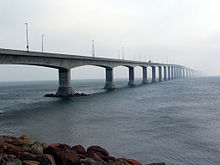Tag Archives: gamal
Droichead na Cónaidhme nó ‘Réise na mBeann Glas’ (Mar a Dúradh) Posted by róislín on Feb 22, 2014
(le Róislín) I couldn’t resist spending a little more time with bridges (droichid) since Canada’s Confederation Bridge has such a clever nickname, as bestowed by …, hmm, which Irish person? (freagra thíos). Just a quick review of the phrase “Droichead na Cónaidhme,” before we get to the nickname: droichead [DRIH-hud], bridge na [nuh], here it…
Lá na nAmadán…na nGamal?…na nÓinseach?…na bPleidhcí?…na bPleotaí? Posted by róislín on Mar 30, 2012
(le Róislín) We may be well accustomed to calling April 1st “Lá na nAmadán” in Irish, but couldn’t there be some other possibilities as well? Irish has many words for “a fool,” so what would happen if we tried some of the others? And, grammatically speaking, how do we work backwards from “fools” in the…
Clásail Choibhneasta Arís: An Briathar “Beir” (Give birth, bring, take, grab, etc.) Posted by róislín on Apr 29, 2010
After some recent digressions, ranging from the “sobhlasta” (coiníní seacláide) to the “éigeantach” (Uncail Sam) or the “dosheachanta” (an bolcán / an Mháthair Dúlra), let’s return to na clásail choibhneasta le briathra neamhrialta. Today’s blog will show the irregular verb “beir” in the three tenses (láithreach, caite, fáistineach) and in a declarative sentence, a question…
Back to the Relative Clauses AND Discussing Fools! Posted by róislín on Mar 31, 2010
(le Róislín) As you may have guessed, this blag will introduce some of the Irish terms for “fool” and will resume our long-awaited (right?) series of irregular verbs in direct and indirect relative clauses. This is in honor of Lá na nAmadán, the day of fools, April 1. Amadán is the most basic Irish word…
Na hAmadáin (ar leanúint) – The Fools (continued) Posted by róislín on Apr 3, 2009
(le Róislín) By now you might be wondering, so what is the Irish word for a female fool? You might have encountered it already, if you’ve read Charles Kickham’s 1879 novel, Knocknagow, which uses an anglicized form of the word, “oonshugh.” English-medium Irish literature of that vintage tends to be full of Irish words, but…



